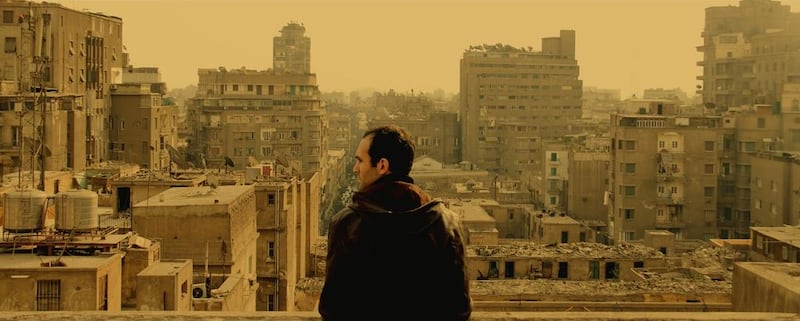After six years of devastating conflict in the Middle East, hope is in short supply for the region's intellectuals. In his new film, In The Last Days of the City, Egyptian director Tamer El Said paints a powerful portrait of hopelessness in the Arab world over the course of two intense hours.
Set two years before the Arab uprisings of 2011, the film delivers a thoughtful critique on the failure of the uprisings to transform anger into concrete social and political change using the dense urban environment of downtown Cairo as a storyboard.
The film, which debuted this month at Manarat Al Saadiyat at an event co-hosted by Cinema Akil and Image Nation Abu Dhabi, takes place in the winter of 2009. The protagonist, Khaled, is a young, idealistic Egyptian filmmaker trying to make sense of his life and finish a long-term film project. His movie is a sporadic set of interviews describing episodes of loss and longing.
One character, an older woman named Maryam, describes the beauty of her family home in Alexandria. The home has been sold to a developer who intends to demolish the building to make way for a mall. The protagonist’s ex-girlfriend Laila features heavily, describing her desire to leave the country. The subjects are filmed negotiating the vast urban matrix of Cairo. The city is in flux and changing all around them, but they have no control or say in its future. They merely react and reflect on the past or some distant dream of the future.
Khaled’s day-to-day life, travelling around his city and breathing in its chaos, is the narrative glue of the film. He searches in vain for a new flat, only to be shown options inhabited by live chickens or with pious neighbours keen to share their beliefs. He sits in Cairo’s famous traffic, listeningto news reports about emergency laws and former Egyptian president Hosni Mubarak’s support for the national football team as it competes in the African Cup of Nations.
Like his characters, Khaled is part of the fabric of the city but appears unable – almost paralysed – to do anything about the changes he sees unfolding around him. He can merely observe, with a sense of bewilderment and melancholy – an obvious metaphor for the position of many intellectuals who struggle to process the failure of the 2011 uprisings.
From the start, Cairo’s cacophony of sounds and pace fill the screen and destabilise the viewer. But El Said’s articulation of hopelessness extends far beyond Cairo as several of Khaled’s friends from around the region make an appearance.
It is only when Khaled’s friends visit for a panel discussion about violence in cities across the region that the film’s message becomes clear. In morbid yet jovial conversations in cafes and rooftops above the city, Khaled's intellectual friends from Iraq and Beirut describe their futile attempts to find normality in cities destroyed by war.
Tarek, an affable character from Beirut, describes his fear of alleyways. In the 1980s, Tarek’s father would hide in alleyways to avoid the fighting on the streets. On more than one occasion, he watched from an alleyway as someone was shot dead. Agreeing to send Khaled footage of his life in Beirut for his friend's film project, Tarek decides to venture into an alleyway to face his own fears.
With shaky hands and heavy breath, he enters the alleyway and describes how uneasy it makes him feel. He stops midway and looks up, swearing off Khaled's silly film idea. Tarek is paralysed with a mix of fear and abandon, both physically and emotionally. He cannot proceed through the alleyway nor can he retreat to the entrance. He merely stops and looks helplessly up to the sky.
For a director grappling with an unfinished revolution, this scene is a metaphor for a project with a beginning but no ending. As a stand-in for the disenfranchised youth of the region, Tarek embarks on a journey of change – by entering the alleyway – only to stop in the middle, unable to retreat or move forward.
Back in Cairo, Khaled is again walking aimlessly through the downtown backstreets. He stumbles upon a protest against Hosni Mubarak on the steps of the journalist syndicate, once a popular site of protest before the 2011 uprising. Khaled appears disengaged with the chants against the regime, and, as he walks away, a young activist comes sprinting out in front of him, chased by undercover police.
The police catch him, beat him senseless and throw him in the back of an unmarked pickup truck. Paralysis returns as Khaled stands idle in the street. He snaps a photo on his smartphone but does nothing to intervene. Six years after the Arab uprisings, Khaled’s voicelessness in front of the journalist syndicate is a damning indictment of the paralysis shared by many across the region.
Nothing, El Said demonstrates in the film, has changed since “the last days of the city”. The stalled and unfinished revolutions that promised change yet delivered regression have only resulted in hopelessness. All that is left for the concerned intellectual is one’s craft and the endless city that affords a sense of respite through its chaotic anonymity.
jdana@thenational.ae
On Twitter: @ibnezra





